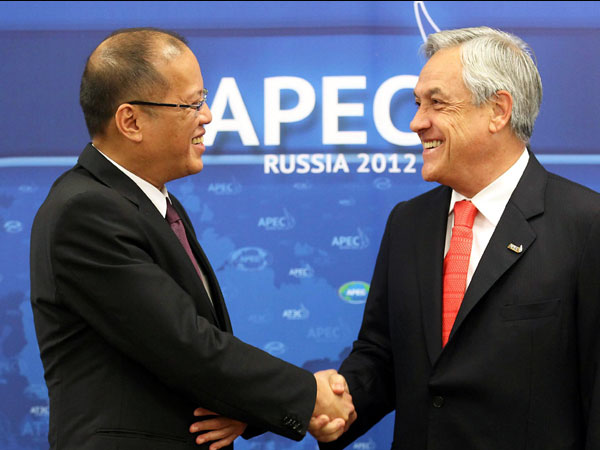
President Benigno Aquino welcomes Chile President Sebastian Piñera during the bilateral meeting at the sidelines of the 20th APEC Leaders’ Summit in Vladivostok, Russia on Saturday. INQUIRER.net/Malacañang Photo
VLADIVOSTOK, Russia—Asia-Pacific leaders called Saturday for unity in tackling a raft of economic challenges, as an annual summit began amid deep divisions over worsening territorial disputes and other rows.
Summit host President Vladimir Putin opened the two-day gathering of the Asia-Pacific Economic Cooperation bloc in the Far East Russian port of Vladivostok with a call for a renewed joint commitment to open up regional trade.
“By getting together and lifting barriers, we encourage dynamic development of the entire Asia-Pacific region and the global economy in general. It is important to build bridges, not walls,” Putin told his fellow leaders.
The 21 members of the grouping that accounts for nearly half of world trade meet every year to build goodwill in their effort to break down trade barriers, with the bloc’s rules decided by consensus.
But this year’s summit began with APEC giants China, Japan and South Korea embroiled in various territorial disputes that have fanned intense nationalist flames, and with US-Chinese relations also heating up over the West Philippine Sea (South China Sea).
Japanese Prime Minister Yoshihiko Noda said he would not hold customary bilateral summit talks with Chinese President Hu Jintao nor South Korea’s Lee Myung-Bak because of Japan’s separate territorial disputes with their nations.
APEC members Vietnam and the Philippines have also spoken out strongly against China in the lead-up to APEC.
They have accused their more powerful neighbor of a campaign of intimidation to enforce its claims to virtually all of the West Philippine Sea, parts of which they contest.
Speaking at a pre-summit business forum earlier Saturday, Chinese President Hu Jintao called for all countries to ensure the tensions did not escalate into more serious conflicts.
“To maintain peace and stability as well as the sound momentum of economic growth in the Asia-Pacific is in the interests of all countries in the region. It is our shared responsibility,” Hu said, while also warning against protectionism.
The United States has riled China by calling for a code of conduct for the China Sea and insisting on freedom of navigation in the strategic waterway. China has also perceived a greater US focus on Asia as an effort to contain it.
US Secretary of State Hillary Clinton — standing in for President Barack Obama — said Thursday on a pre-summit swing through the region that Washington was not going to shy away from standing up for American strategic interests.
She emphasized at a business forum on the sidelines of the summit on Saturday that the United States was determined to increase its economic and political footprint in the region.
“After an extended period in which the United States had to focus a great deal of attention and resources on regions and conflicts elsewhere, we are now making substantially increased investments in the Asia-Pacific,” she said.
“We seek to work with others to build a stable and just regional order that will benefit everyone.”
APEC leaders have insisted they will still make progress in Vladivostok in opening up economies.
They will jointly call for greater efforts to “support growth and foster financial stability and restore confidence”, according to a draft of a leaders’ statement to be released at the end of the summit and obtained by Agence France-Presse.
It warns of mounting risks to the region from eurozone crisis in Europe and pledges to work to stoke domestic demand to counter falling exports.
The assembled leaders are also expected to approve a deal reached Thursday by their trade ministers to cut tariffs on a list of dozens of “green” products in the Asia-Pacific to boost trade in the goods and help protect the environment.
Putin’s government has poured $20 billion into reviving Vladivostok, Russia’s largest Pacific port, in hopes of turning it into an investment hub and promoting his nation’s Pacific ambitions.